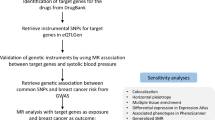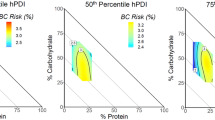Abstract
Many epidemiological studies have found that leptin correlates to body fat extent and breast cancer. Leptin exerts its physiological action through the leptin receptor (LEPR). However, published data on the association between LEPR alleles and breast cancer occurrence have led to in contradictory results. A total of 10 studies were identified to the meta-analysis, including 4,644 cases and 5,485 controls for LEPR rs1137101 polymorphism, 5 studies with 2,759 cases and 4,464 controls for rs1137100 polymorphism, and 2 studies for rs8051542, rs8051542, and rs8051542 polymorphisms. The pooled odds ratios (OR) with 95 % confidence intervals (CI) for breast cancer risk associated with LEPR genotypes were estimated. Elevated breast cancer risk was associated with LEPR rs1137101 polymorphism when all studies were pooled in the meta-analysis (allele contrast model: OR = 0.71, 95 % CI = 0.551–0.997). In the stratified analysis by ethnicity, significantly increased risks were also found among Asians for allele contrast model (OR 0.414, 95 % CI 0.312–0.550) and dominant model (OR 0.537, 95 % CI 0.370–0.781); for Africans, significantly increased risks were also found for allele contrast model (OR 0.716, 95 % CI 0.595–0.861), homozygote codominant (OR 0.537, 95 % CI 0.370–0.781) and dominant model (OR 1.595, 95 % CI 1.207–2.108). And significantly elevated breast cancer risk was associated with LEPR rs1137100 polymorphism for allele contrast (OR = 0.666, 95 % CI = 0.603–0.720) and homozygote codominant models (OR = 0.344, 95 % CI = 0.282–0.421). For LEPR rs8179183, rs4655537, and rs3762274 polymorphisms, no significant associations were detected in all comparison models. This pooled analysis suggested that rs1137101 and rs1137100 polymorphisms were significantly correlated with breast cancer risk and the A allele of LEPR rs1137101 variant and the G allele of LEPR rs1137100 variant were low-penetrant risk factors for developing breast cancer. Further, no significant associations existed between LEPR rs8179183, rs4655537, and rs3762274 polymorphisms and risk of breast cancer.





Similar content being viewed by others
References
Lichtenstein P, Holm NV, Verkasalo PK et al (2000) Environmental and heritable factors in the causation of cancer–analyses of cohorts of twins from Sweden, Denmark, and Finland. N Engl J Med 343(2):78–85
Dong LM, Potter JD, White E, Ulrich CM, Cardon LR, Peters U (2008) Genetic susceptibility to cancer: the role of polymorphisms in candidate genes. JAMA 299(20):2423–2436
Welcsh PL, King MC (2001) BRCA1 and BRCA2 and the genetics of breast and ovarian cancer. Hum Mol Genet 10(7):705–713
Stephenson GD, Rose DP (2003) Breast cancer and obesity: an update. Nutr Cancer 45(1):1–16
Hu X, Juneja SC, Maihle NJ, Cleary MP (2002) Leptin—a growth factor in normal and malignant breast cells and for normal mammary gland development. J Natl Cancer Inst 94(22):1704–1711
Laud K, Gourdou I, Pessemesse L, Peyrat JP, Djiane J (2002) Identification of leptin receptors in human breast cancer: functional activity in the T47-D breast cancer cell line. Mol Cell Endocrinol 188(1–2):219–226
Chung WK, Power-Kehoe L, Chua M, Leibel RL (1996) Mapping of the OB receptor to 1p in a region of nonconserved gene order from mouse and rat to human. Genome Res 6(5):431–438
Thompson DB, Ravussin E, Bennett PH, Bogardus C (1997) Structure and sequence variation at the human leptin receptor gene in lean and obese Pima Indians. Hum Mol Genet 6(5):675–679
Woo HY, Park H, Ki CS, Park YL, Bae WG (2006) Relationships among serum leptin, leptin receptor gene polymorphisms, and breast cancer in Korea. Cancer Lett 237(1):137–142
Snoussi K, Strosberg AD, Bouaouina N, Ben AS, Helal AN, Chouchane L (2006) Leptin and leptin receptor polymorphisms are associated with increased risk and poor prognosis of breast carcinoma. BMC Cancer 6:38
Teras LR, Goodman M, Patel AV et al (2009) No association between polymorphisms in LEP, LEPR, ADIPOQ, ADIPOR1, or ADIPOR2 and postmenopausal breast cancer risk. Cancer Epidemiol Biomarkers Prev 18(9):2553–2557
Cleveland RJ, Gammon MD, Long CM et al (2010) Common genetic variations in the LEP and LEPR genes, obesity and breast cancer incidence and survival. Breast Cancer Res Treat 120(3):745–752
Gallicchio L, McSorley MA, Newschaffer CJ et al (2007) Body mass, polymorphisms in obesity-related genes, and the risk of developing breast cancer among women with benign breast disease. Cancer Detect Prev 31(2):95–101
DerSimonian R, Laird N (1986) Meta-analysis in clinical trials. Control Clin Trials 7(3):177–188
Mantel N, Haenszel W (1959) Statistical aspects of the analysis of data from retrospective studies of disease. J Natl Cancer Inst 22(4):719–748
Egger M, Davey SG, Schneider M, Minder C (1997) Bias in meta-analysis detected by a simple, graphical test. Br Med J 315(7109):629–634
Liang J, Chen P, Hu Z et al (2010) Genetic variants in trinucleotide repeat-containing 9 (TNRC9) are associated with risk of estrogen receptor positive breast cancer in a Chinese population. Breast Cancer Res Treat 124:237–241
Li L, Zhou X, Huang Z, Liu Z, Song M, Guo Z (2009) TNRC9/LOC643714 polymorphisms are not associated with breast cancer risk in Chinese women. Eur J Cancer Prev 18(4):285–290
IuM U, Imianitov EN, Vasil’ev DA, Bershtein LM (2008) Polymorphism of glucose intolerance and insulin resistance susceptibility genes in oncological patients. Mol Biol (Mosk) 42(6):947–956
Okobia MN, Bunker CH, Garte SJ et al (2008) Leptin receptor Gln223Arg polymorphism and breast cancer risk in Nigerian women: a case control study. BMC Cancer 8:338
Nyante SJ, Gammon MD, Kaufman JS et al (2011) Common genetic variation in adiponectin, leptin, and leptin receptor and association with breast cancer subtypes. Breast Cancer Res Treat 129(2):593–606
Han CZ, Du LL, Jing JX et al (2008) Associations among lipids, leptin, and leptin receptor gene Gin223Arg polymorphisms and breast cancer in China. Biol Trace Elem Res 126(1–3):38–48
Baratta M (2002) Leptin—from a signal of adiposity to a hormonal mediator in peripheral tissues. Med Sci Monit 8(12):282–292
Mattevi VS, Zembrzuski VM, Hutz MH (2002) Association analysis of genes involved in the leptin-signaling pathway with obesity in Brazil. Int J Obes Relat Metab Disord 26(9):1179–1185
He BS, Pan YQ, Zhang Y, Xu YQ, Wang SK (2012) Effect of LEPR Gln223Arg polymorphism on breast cancer risk in different ethnic populations: a meta-analysis. Mol Biol Rep 39(3):3117–3122
Conflict of interest
The authors are fully responsible for all content and editorial decisions, and they have not received any financial support or other form of remuneration related to the development of this article.
Author information
Authors and Affiliations
Corresponding authors
Rights and permissions
About this article
Cite this article
Wang, Lq., Shen, W., Xu, L. et al. The association between polymorphisms in the leptin receptor gene and risk of breast cancer: a systematic review and pooled analysis. Breast Cancer Res Treat 136, 231–239 (2012). https://doi.org/10.1007/s10549-012-2228-9
Received:
Accepted:
Published:
Issue Date:
DOI: https://doi.org/10.1007/s10549-012-2228-9




